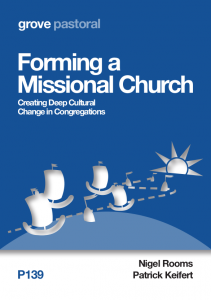Q&A: How do we bring about cultural change in our churches?
A Friend asks:
My question is, how do we, who are in Christian leadership encourage and bring about cultural change in our churches? I am sure that it is already a question that you are grappling with and probably have no easy answers to.
In the past I would have simply said the main component is leading by example. Lead and others will simply change. In recent experience I would say that, unfortunately that only seems to work when the people around are teachable and actively pursuing growth.
Previously I would have also said teach from the Scriptures and let them speak for themselves. But again, I have seen time and time again a misunderstanding of those Scriptures even when it is spelled out in black and white.
And then what do you do when there are different cultures in the mix? I don’t mean racial cultures, but church cultures. How do we authentically worship when so many different priorities are given to the various components of what constitutes a worship service or Bible study? How do we encourage true disciples in a way that is maintainable in Western society and yet still confronting, challenging and deep?
[This is a Q&A question. You can submit a question (anonymously if you like) here: http://briggs.id.au/jour/qanda/]
 Thank you, dear friend. What a joyfully fundamental question! Answer this, and you will have answered the cry of the heart of every pastor who takes their calling seriously. Books have been written about this. Even Archbishops’ Councils wrestle with the conundrum – I reflected on a recent attempt at “Setting God’s People Free” not too long ago.
Thank you, dear friend. What a joyfully fundamental question! Answer this, and you will have answered the cry of the heart of every pastor who takes their calling seriously. Books have been written about this. Even Archbishops’ Councils wrestle with the conundrum – I reflected on a recent attempt at “Setting God’s People Free” not too long ago.
You’re right. I am grappling with it, and I don’t have any easy answers. There is a whole bunch of theory out there about changing organisational culture etc. In my mind, however, it’s like mentoring and spiritual direction; it relies on discernment more than anything else and therefore can only truly be known in context and in practice, not in theory. So here follows some random thoughts from what I’ve seen in the real world:
The first thing I want to do in response is to affirm the premise of the question. Cultural change is to a church what sanctification is to a person. Just as individuals Christians are called to grow into maturity in Christ, so churches are called to grow into maturity as the Body of Christ.
The road of maturation for an individual is, necessarily, “a long road of obedience in the same direction” (I think I’m quoting Eugene Peterson there). It involves confronting one’s past, one’s brokenness, one’s fears and pains. It involves repenting of sin, and seizing the lifegiving ways of God with a firm faith in his grace. It can involve times of trial and failure, as well as the temptations of both success and boredom. This is something we all understand.
That leadership task is first and foremost not about the “professional” tasks of institutional refurbishment and resource management, it is the “pastoral” task of leading a community on a long road of obedience. As I said many years ago, this means “we have to talk about the real issues – rebellion, idolatry, lack of belief, hard-heartedness, and unfaithfulness – rather than the excuses of broken systems.”
More recently I have reflected a little more deeply on this. Culture itself can be conceived of in terms of the “stories we tell each other”, i.e. it is grounded in a narrative that encapsulates the collective worldview. A racist culture will share a narrative about the inhumanity of different ethnicities, for instance. Similarly, the grounding of an individual person’s life can also be thought of in terms of narrative: what story helps us conceive of ourselves within the world? This is why we consider things like “self-talk” when we help an individual to reflect. Individuals and churches share a narratival world, i.e. a cultural context.
The Christian task is to make sure we are operating out of the correct narrative so that we conceive of ourselves and the world according to God’s truth, and where we find ourselves in his story. In fact, we can think of the conversion experience in terms of an exchange of stories, where we die to an old narrative of sin and self-centredness, and are raised to find ourselves in another story in which Jesus is King, and we are forgiven and embraced. I alluded to this in a recent sermon on wisdom in Job, if you have some time to listen.
The sad fact is, in these terms, some churches, as much as any individual, need to convert to Christ. That is the cultural change that is needed. And it is an ongoing journey. As the saying goes: “I AM saved, I am BEING saved, I WILL be saved”
But your question is how do we bring cultural change about?
Firstly, understand that just as with individual sanctification, it is not entirely humanly possible. “Work out your salvation with fear and trembling,” Paul says in Philippians 2, “for it is God who works in you to will and to act in order to fulfil his good purpose.” Work it out, because God is at work in you, and in the church. Or as someone wise I know says, “We are Christ’s church, and he will grow us.”
This isn’t a cop-out, it’s a focus. And the practical application is this: It begins with worship. Sort out the upward focus of your life first, work on the upward focus of the church first, and all manner of other things will sort themselves out.
This rubs up against one of your subquestions about authentic worship in competing church cultures. One form of worship can only compete with another if we are worshipping the wrong thing! Yes, we need to attend to our attitudes, and recognise different styles, and compromise a bit about liturgical rigour. But I’ve only ever seen this work when the attitude has been “we are all here to help one another to worship Jesus.”
Secondly, your negative experiences don’t mean you had the wrong idea. You talk about leading by example, and about preaching the word. Sometimes they don’t seem to “work.” That doesn’t mean that they are the wrong thing to do.
In fact, they are the right thing to do. Our story changes, our culture shifts, as individuals and as churches, when we pay heed to what the Lord has to say to us. He has spoken the words of life, and by God’s grace, that word is present for us to read, hear and receive. Preach the word, brothers and sisters! Do it without fear or favour, without tickling ears. And by some miracle, and the power of the Spirit, that word will take root and shift our story.
Similarly, preach with your deeds. As Paul exhorted Timothy set an example for the believers in speech, in conduct, in love, in faith and in purity.
In both cases, of courses, the preaching may seem fruitless. People are hardened to the word, unteachable; they mishandle the Word of God to suit their own ends. You can’t do anything about that. But we preach the word both in and out of season.
As a leader, of course, there is a sense in which we must go ahead. We must preach to ourselves first. We must attend to our own sanctification. It is often the case that churches “catch up” to the culture of their leaders. Unless the leader is willing to attend to the long walk of obedience in themselves, they are likely to be content in their existing church culture where their insecurities are stabilised and their sins are acceptable.
So it’s an absolute imperative: Sanctification begins with me. Personally, I have to say that to myself, even today.
Thirdly, you ask about encouraging “true disciples… in a way that is maintainable in Western society and yet still confronting, challenging and deep?”
In my experience, what you are hoping for here is blocked by the blindness of the culture that you’re hoping to change. In the West our culture is significantly shaped by consumerism and individualism. When the term “discipleship” is used in churches it has often been emptied of its real meaning and held captive by the culture; it is reduced to a product by which consumer Christians are given “nice ideas by which I might build a successful spiritual life.” It has elements of truth, but it has a self-righteous posture; there is an incomprehension that we might have to have our story shifted.
We need to cut across that dynamic somehow, and sometimes we need to be upfront about it. The gospel is encouraging and lifegiving, and it is about being unmade as much as it is about being remade. The gospel is about conviction and confrontation as much as it is about affirmation. We can set expectations, explaining to people that we are expecting to be undone by God, in fact hoping to be challenged and confronted with ourselves. Otherwise, what’s the point?
We also need to give them the tools to proceed. A good tool is the ability to question our own cultural assumptions, to question ourselves. Help them to affirm what can be affirmed and question what needs to be questioned. Push for the story underneath the top layer. Ask “why?” a lot. “Why do we do that? Why, really?” What’s under the facade? “We have words to explain ourselves, but what do we really believe?” It’s the difference, as they say, between “espoused theology” and “actual theology”. The exposition of Moral Therapeutic Deism is an excellent case study in this; it is the actual religion of much of the Western church.
Above all, this is a pastoral task. The incarnation teaches us about how God enters into our world in order to bring us out of darkness into his wonderful light. We must have the same attitude of Christ. Enter the culture. Affirm what can be affirmed. Work out where the ugly bits rub against the gospel, and then bring that light to bear, beginning in yourself. Walk the hard road, and when others join you in it, rejoice.
Photo Credit: © Copyright Peter Trimming and licensed for reuse under CC BY-SA 2.0 Licence.




